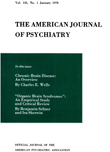PSYCHIATRIC SYMPTOMS ASSOCIATED WITH INTRACRANIAL NEOPLASMS
Abstract
The presence of psychiatric symptoms in patients with intracranial neoplasms often increases the difficulty of recognizing the true nature of the patient's trouble. Such symptoms are frequently associated with brain tumors. A review of the records of 128 patients with proved intracranial neoplasms seen at the Ochsner Clinic revealed that approximately half exhibited on admission symptoms that could be considered "psychiatric." Alert suspicion during history-taking and examination is the best means of appreciably minimizing diagnostic errors, since there is usually apparent a symptom or sign that should serve to cause the examiner to exercise diagnostic caution.
In this series there existed a similarity in incidence of psychiatric symptoms exhibited by patients with tumors of the frontal and temporal lobes. Some psychiatric symptoms stem from the cerebral damage incident to the tumor and are fairly definite, whereas others are vague and seem to be part of the patient's previous personality, perhaps accentuated by his total reaction to his illness. Cases illustrating this point are cited.
Access content
To read the fulltext, please use one of the options below to sign in or purchase access.- Personal login
- Institutional Login
- Sign in via OpenAthens
- Register for access
-
Please login/register if you wish to pair your device and check access availability.
Not a subscriber?
PsychiatryOnline subscription options offer access to the DSM-5 library, books, journals, CME, and patient resources. This all-in-one virtual library provides psychiatrists and mental health professionals with key resources for diagnosis, treatment, research, and professional development.
Need more help? PsychiatryOnline Customer Service may be reached by emailing [email protected] or by calling 800-368-5777 (in the U.S.) or 703-907-7322 (outside the U.S.).



